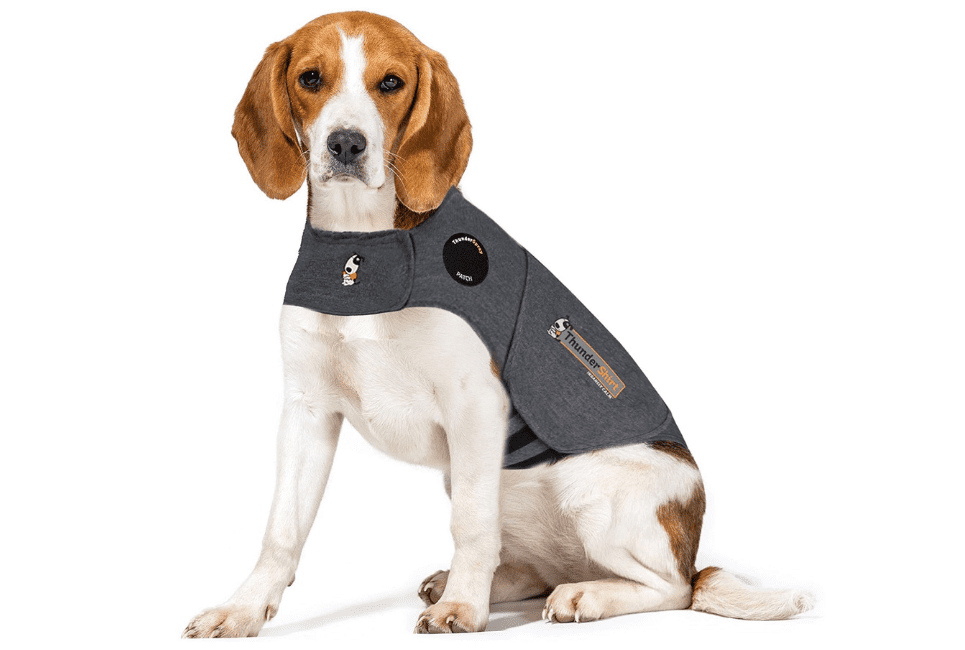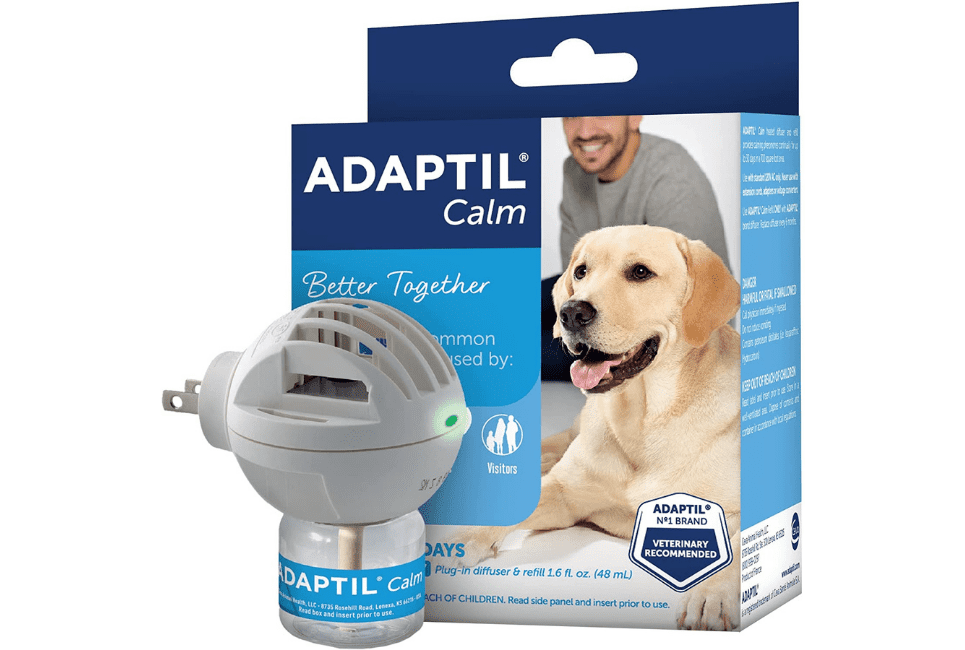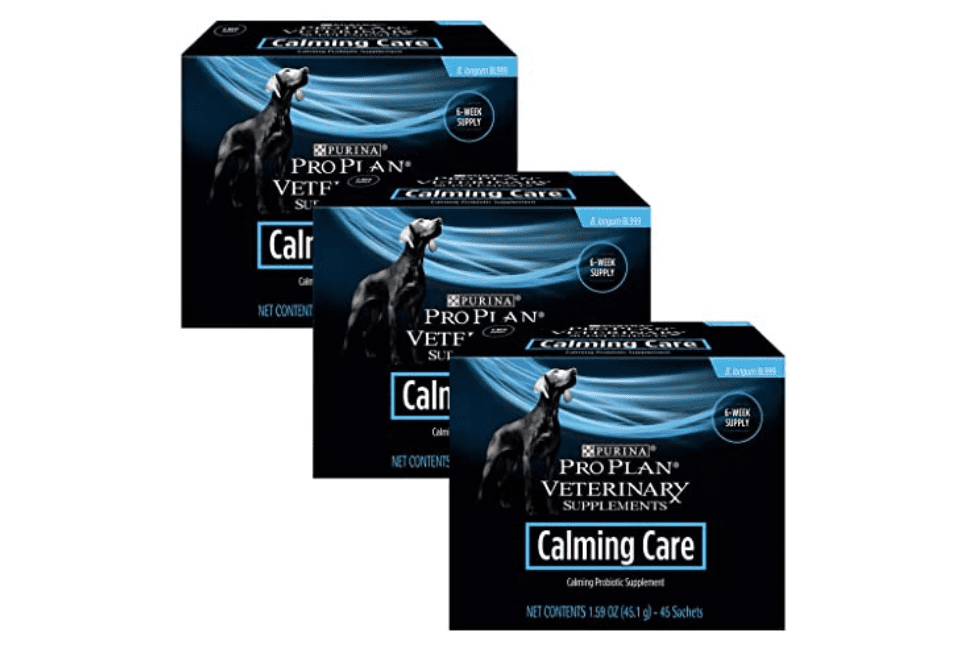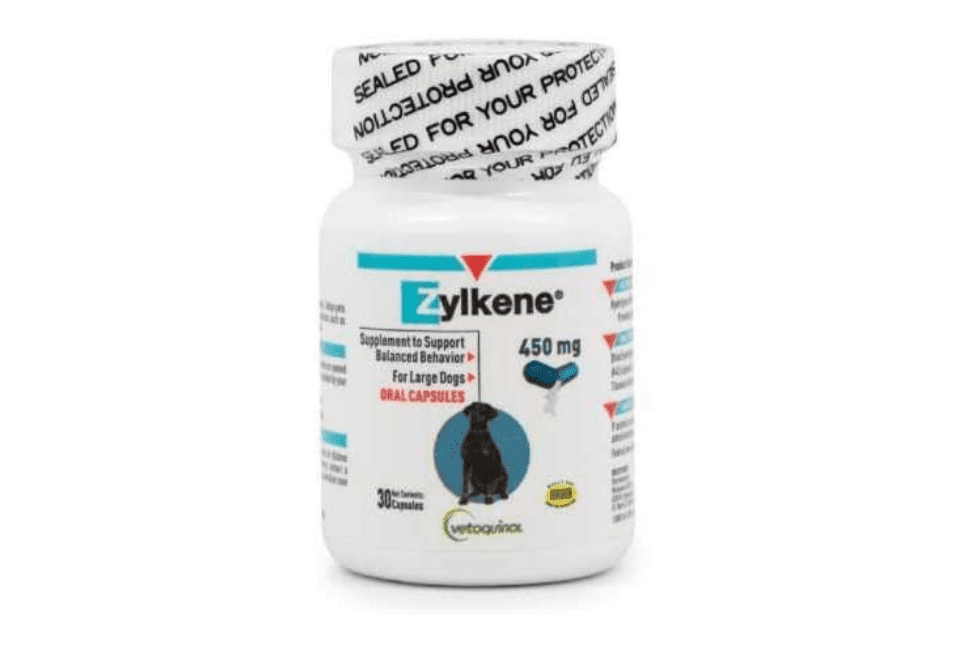- Nom Nom Dog Food Subscription Review - November 7, 2023
- 7 Best Dog Bed Ideas For Great Dane (DIY Options) - July 16, 2022
- Top 5 Rated Best Non-Prescription Diabetic Dog Food - July 15, 2022
Dogs are a great addition to any family, but they can have anxiety just like humans. It’s hard enough for us to deal with the anxiety of everyday life, but imagine dealing with it when you’re a dog. Dogs can become stressed for many reasons, including changes in routine, loud noises, lack of exercise, and more.
Dealing with dog anxiety is never easy. You may not know what to do, or you may be unsure of how to help your pup. If you are a dog owner, you know the feeling of worry and concern when your pup is showing signs of anxiety.
There are many different reasons why dogs can show these symptoms, including separation anxiety, noise phobias, or even stress caused by an illness like pancreatitis. The good news is that there are many different ways to try and reduce your dog’s anxiety levels. There are many treatments available that will help your dog feel less anxious and live a happier life!
This blog post will give you some ideas for how to deal with canine anxiety, as well as reviews of products that can help calm down anxious dogs, so they don’t feel so alone at home when their owner isn’t around. We will review several treatment methods for anxiety in dogs, including medication, natural remedies, and supplements, as well as some product recommendations that may help your furry friend feel better.
What Are Anti-Anxiety Products for Dogs?
Anti-anxiety products for dogs are any product meant to reduce your dog’s anxiety levels. There is a wide variety of options available, and knowing what each option does will help you find the best product for your situation.
Traditional anti-anxiety medication can be used when other methods haven’t worked, but it should only be used as a last resort and should never be given without veterinary supervision. Anti-anxiety medication for dogs is similar to anti-depressants used in humans, but there are some different varieties depending on your dog’s needs.
Using products like this should also depend on the cause of your dog’s anxiety. Some causes can be treated with some of these products, while others will need a different approach.
What Causes Anxiety in Dogs?

There are several causes of anxiety in dogs. Some common ones include:
- Separation Anxiety
- Fearful Temperament
- Not Enough Mental Stimulation/Exercise
- Age
Let’s dig into that in a little more detail:
Fear
Fearful anxiety is usually caused by a past traumatic experience. Fearful dogs are the ones that will cower in a corner when you raise your hand or have more of an “on edge” temperament. They may seem easily startled and not want to put themself in any situation where they feel threatened.
Separation Anxiety
Dogs with separation anxiety can often show signs of destructive behavior when their owner leaves. They may be clingy, whine all the time, or bark when they are home alone. This can be caused by past experiences where their owner was not present to help them feel safe and secure (e.g., being abandoned) or something as simple as being separated from their mother too early (which is why all puppies should stay with their mothers until at least eight weeks old).
Age
Just like humans, senior dogs are more likely to have anxiety. This is because their cognitive abilities start decreasing, and they aren’t able to navigate the world around them as easily, leading them to feel uncertain about their surroundings.
Not enough mental stimulation or exercise
Dogs that don’t get enough mental stimulation can have behavior problems that are related to boredom. Dogs need regular physical activity and playtime, but they also need some sort of mentally stimulating activity as well (e.g., food puzzle toys). If you don’t provide them with this daily, their anxiety may lead to destructive behaviors like digging or chewing on things when left alone.
What are the Symptoms of Anxiety in Dogs?
So, now that you know what types of anxiety there are let’s talk about the symptoms. There can be a lot of different signs and behaviors associated with anxiety in dogs depending on their type, so here is a list to help you recognize if your dog is anxious:
- Barking or whining
- Destructive behavior (chewing, scratching, digging)
- Eliminating in the house (urine, feces)
- Salivating or drooling excessively
- Pacing or restlessness
- Vomiting or regurgitation
- Hiding or isolating themselves from social interaction
- Excessive grooming or licking. If extreme, this can even cause hair loss
- Trembling
- Whining, excessive whining, or crying
- Anxiety attacks (panting or being unable to breathe)
If you notice any of these symptoms in your dog or see that they are acting abnormally toward people or other dogs, it’s time to seek help.
It’s usually best to take them to the vet first, just to make sure there isn’t something else going on. There are some diseases where their anxiety is caused by physical pain, which will need medication for treatment as well.
However, most cases of anxiety can be treated with natural remedies and products at home without the need for medications.
Let’s look at those now.

What are the Different Types of Anti-Anxiety Products for Dogs?
As we’ve mentioned, there are lots of products that you can use for your dog’s anxiety. You need to consider what type of product or natural remedy is best suited for their form of anxiety and the symptoms they have been showing.
The following are different types of products you can try:
Training or Counterconditioning
The first port of call, particularly with fear or separation-based anxiety, should always be to first try to train your dog out of the behavior. This is often referred to as counterconditioning and desensitization, where you work on changing their perception or association with what is currently causing them anxiety.
For example, if they are scared of men because they were attacked by one when they were younger, through gradual exposure (with help from a professional trainer), you can teach them that not all men are bad.
You will have seen this method used at puppy socialization groups where people let their dogs get accustomed to each other slowly instead of just throwing them in at the deep end together, which might cause fighting and add to their stress.
Pet Appeasing Pheromones
These pheromone products come in either spray form or an electric diffuser that releases calming pheromones in the air. The pheromones released are supposed to have a soothing effect on your dog, reducing their anxiety and fear responses.
You can also try using natural essential oils like lavender or chamomile, which some people find helps reduce their dogs’ stress levels (although it’s not been proven). You can use these products either by diffusing them in the air or applying them directly to your dog’s bedding.
Calming Collars and Wraps
The idea behind calming collars/wraps is that they work like swaddling for babies, helping with relaxation through pressure on key parts of their body (e.g., neck or back). They come in a variety of styles and brands, some with pheromone sprays built-in.
For dogs who are particularly anxious or hyperactive, these products may help them to relax enough to be able to calm down and soak up the benefits from other anti-anxiety treatments you might use at home.
Calming Vests or Coats
Calming vests and coats work by applying gentle pressure to your dog’s chest. They come in different designs, such as those with a Velcro opening (easier for dogs who dislike wearing clothes) or those that wrap around like a harness.
You can use these products either when you’re out walking, during times of high anxiety, such as during a thunderstorm.
Calming Treats
There are also calming treats you can buy for your dog. These work by using the same training method as with pheromone products, where they need to be exposed to whatever is causing them anxiety gradually until it no longer scares them.
You’ll find that the main ingredients of these types of treats are things like chamomile, valerian root, and L-Tryptophan.
CBD Oil
If you have a dog who suffers from separation anxiety or is generally anxious, there are some products containing cannabidiol (CBD) that might be worth trying out. CBD has been shown to help reduce anxiety in people with social phobias and may work similarly for dogs too.
Calming Dog Beds
As well as anti-anxiety products, you can also try getting your dog a new bed to help with their anxieties. Just like humans get better sleep in more comfortable surroundings, so do our furry friends. You can buy ‘orthopedic’ or stretchy memory foam pet beds, which can help with joint pain and anxiety. You can also buy beds specifically for dogs that have anxiety.
Calming Music
Playing calming music on a regular basis is another method some people have had success using to reduce their dog’s anxieties.
You don’t need anything fancy – just search for ‘soothing dog songs’ on YouTube or Spotify. Or perhaps consider an audiobook of nature sounds if your dog likes more background noise.
This can help a lot with separation anxiety as the sound of music or people talking – such as the radio – can be comforting to your dog.
Toys
Next, you can try using toys to help with anxiety. This works especially well for dogs that are normally very playful and get anxious when they can’t play. There are a number of interactive dog toys out there, such as Kongs or treat-dispensing balls, which you fill up with treats then leave your dog to figure out how to empty the toy themselves.
On the other end of the spectrum, there are also heatable toys that are designed for your pup to snuggle against when they need comforting.

Supplements
There are also supplements you can give to your dog which have been shown to help with anxiety issues. These contain things like taurine, L-theanine, and chamomile extract – similar ingredients to some of the calming treats we mentioned above.
However, these shouldn’t be your go-to solution. Instead, try them out if your dog doesn’t seem to respond well to the other approaches, particularly training.
Alternatively, you could consider giving them a product like K-calm, which is designed for this exact purpose. It’s an all-natural supplement that has been shown in studies to reduce anxiety and stress levels in dogs by up to 50%.
Medication
Finally, and only with approval from a qualified vet, you could consider using anti-anxiety medications for dogs.
These are for times when nothing else has worked, or perhaps if your dog is very anxious and it’s impacting on their quality of life – such as being really scared to go out walking due to other dogs in the area.
Anti-anxiety medication will need a prescription from your vet, so they can assess your dog’s particular anxieties and prescribe the best medication for them.
What Should you Look for in Anti-anxiety Products for Dogs?
So, if you’re looking for anti-anxiety dog products, there are a few things you should bear in mind.
Firstly, and rather obviously, they need to be ‘dog safe’ – so check the ingredients and make sure they’re not toxic for your pet.
Secondly is that it’s important not to apply such products too liberally or give them more than recommended because this can have an opposite effect and actually increase your dog’s anxiety.
Finally, you need to remember that while some products – such as CBD oil and calming music – may help reduce general stress levels in dogs, they’re not a ‘quick fix’ for serious anxieties like phobias or separation anxiety. You should look at them more as long-term solutions rather than a one-off treatment, and always, always look into training.
These are some of the things you’ll need to consider when looking into anti-anxiety medication for your dog:
Type/Method
Of course, the first thing you’ll need to think about is the method of treatment. This will be influenced by your dog’s specific anxieties and what they find most helpful. You can use the options above to see which methods you think would best suit them, such as music for or a treat-dispensing toy for separation anxiety when left alone.
Effectiveness
You’ll also need to consider how effective the product is likely to be. This will depend on your dog’s anxieties, but you should also bear in mind that some products are designed for certain types of anxiety – such as phobias or separation anxiety – and these aren’t always suitable for other types of anxieties.
Duration
You’ll also need to think about how long the product is likely to last. Some products will stop working after a certain period of time – for instance, treat or food dispensing toys – which may only last for an hour or two rather than all day. It’s also worth noting that some anti-anxiety medications aren’t suitable for permanent use, so make sure you check this before buying.
Reliability
You’ll also need to think about the product’s reliability. This will be influenced by how effective it is and for what duration – but also whether they actually work in your dog’s case. But, in many cases, this is more of a ‘try it and see’ type of scenario.
Reviews or Customer Feedback
You’ll also need to consider the reviews and feedback of the product. Of course, this doesn’t necessarily mean that products with poorer reviews or less feedback will be any worse than the others. Sometimes people just don’t leave product reviews, whether because they simply forget or it’s not worth their time.
However, if a particular product has a lot of negative feedback, it could mean that there are problems with the product or that it doesn’t work. It’s always worth checking out these reviews and seeing if you can find any common issues or concerns – but keep in mind that this isn’t always an accurate reflection of how good the product is.
Vet Suggestions
Of course, seeking advice from professionals is always a good idea. Your vet will be able to give you a better idea of what products are likely to work for your dog, as well as any potential side effects or things that may need special attention. In some cases, they might even have their own recommendations.
As we all know, dogs can experience anxiety from many different causes. These include those related to fear, phobias, separation anxiety, and dementia – but their effects can be just as bad. While some cases can seem severe, there are plenty of treatment options available to help calm your dog’s fears and anxieties.
However, it’s important that you act quickly when things get really bad because the longer you wait then, the harder they’ll be to treat.
Cost
Finally, you’ll need to consider the price of the products you’re interested in – particularly if they’re medications or supplements, which can be quite costly.
You should bear in mind that you may need a long-term solution rather than quick fixes for acute anxiety issues, so it’s important not to just try and ‘cheap out’ and make sure your chosen method is sustainable long term. However, if you’re on a tight budget and the product has good reviews, it might be worth trying anyway.
Dealing with Dog Anxiety Top Tips
Dealing with a dog who has anxiety can be difficult. However, there are plenty of things that you can do to help your dog relax and deal with their anxieties in a positive way. These include:
- Being patient – being understanding about the fact they have fears is important, but it doesn’t mean you need to put up with bad behavior or constantly ignore them when they’re misbehaving because this will only increase anxiety levels further.
- Seeking professional advice such as from your vet or an animal behavioral specialist (in some cases). If necessary, these professionals should be able to make recommendations based on what’s likely to work best for your dog specifically.
- Using treats and food dispensing toys – using rewards like these can be helpful for dogs who struggle without something else distracting them, while also helping with training.
- Using thunder shirts and anxiety vests – these are products that use gentle pressure to help calm anxious dogs by reducing their heart rate. They don’t work for every dog, but they might be worth trying if your vet suggests it or you come across evidence of them working in other cases
- Taking things slowly – this is particularly important when using anti-anxiety medications because the last thing you want is for them not to take them properly, so make sure you gradually increase dosage amounts instead until they get used to taking the medication regularly. This will reduce side effects such as drowsiness which can put some pets off taking regular doses long term.
- Never shouting or punishing the dog for anxiety-related behavior. This will only increase the dog’s fears and anxieties, making things worse in the long run instead of better.
- Exercise your dog – an active dog is a happy and healthy dog, so it’s important to exercise on a regular basis. This will help release feel-good hormones, which can boost mood while also reducing stress levels and the chances of anxiety developing in the first place
- Cuddle and comfort your dog – there’s nothing wrong with comforting your canine if they are feeling a little unsure. There are many training guides that advise against this, saying that it only re-assured the dog that there is something to fear. However, the truth is that many dogs actually find cuddling comforting – especially if they are used to it. Just be careful not to go overboard and be careful not to reward anxiety-related behavior.
- Play them some music – sound has a direct effect on the brain and can help calm down an anxious dog. You don’t need to play them music all day, but just having it in the background when they’re at home could have a noticeable calming influence which will reduce stress levels. This is especially effective if you’ve chosen classical or other instrumental tunes because dogs respond better to these kinds of sounds (in most cases).
Our Top Anti-Anxiety Products for Dogs Recommendations
ThunderShirt Classic Anxiety Vest for Dogs
The vet-approved vest has a tight fit and pressure points that simulate the effects of a gentle hug to soothe anxious behaviors.
According to research published in the Journal of Veterinary Behavior, 89% of dog owners thought the vest was successful.
The vests are made from breathable, machine-washable fabric and come in sizes XS to XXL and are the perfect way to dress your dog for relaxation.

Pros
- One time purchase
- High success-rate
Cons
- Some dogs might respond negatively to additional clothing
Calming Cuddler Doughnut Bed
This soft doughnut bed is designed to provide a cozy, safe space for anxious dogs. Dogs naturally retreat to a safe space when they feel threatened, and the doughnut bed provides a similar effect.
The wide bolster encircles the edge of this fake fur bed, allowing your dog to sink into the fabric and feel safe on all sides.
The Calming Cuddler is designed with breathable, machine-washable fabric and includes zipper closures for easy cleaning. The product comes in an array of colors and sizes to best suit your dog’s needs.

Pros
- It comes in a range of sizes from small to extra large
- The cover comes off, so it’s easier to clean when needed
Cons
- It might not be as reliable as other methods
ThunderWunders Calming Chews
For those canines who don’t respond well to shirts or fluffy beds, these are a perfect alternative for calming your dog’s anxiety. These calming chews are effective at relaxing your dog or cat quickly but are safe for long-term use.
They can be used for both cats and dogs and contain a variety of calming ingredients to suit your dog’s needs. This includes chamomile flower, hemp, and thiamine.

Pros
- All-natural ingredients
- The long-acting formula is effective in minutes
- Great for anxious pets who don’t like wearing clothing
- Effective with both cats and dogs
Cons
- No product is 100% guaranteed to work on all dogs.
Adaptil Calm Home Diffuser & Refill
This incredibly popular solution by Adaptil is a great way to provide a sense of calm for your dog. The diffuser is easy to use and can be plugged in anywhere in the home where your dog spends the most time. It won’t have any negative effects on other pets in the home, either.
It works by emitting a comforting pheromone that dogs pick up on, even if they can’t hear or see anything. These comfort the dog and mimic a feeling of safety and security.
It can help reduce problem barking, chewing, and destruction caused by anxiety in your dog. Adaptil also comes as a spray form which can help with travel anxiety and loud noises.

Pros
- It can help minimize stress-related behavior for all dogs
- Clinically proven to help with separation anxiety, loud noises, travel, and more
- Easy to use
- It can be used anywhere in the house
Cons
- The plugin needs a socket to work
Smart Pet Love Snuggle Puppy Toy
Dogs like to live in packs, so they like to stick with their owners. Their owner is now their pack after they leave the litter. Dogs are drawn to what feels real, which is why the Snuggle Puppy is great for anxiety in dogs. The dog can cuddle up and feel like it is in a pack again, feeling comforted.
The Snuggle Puppy appeals to our primal desires by providing a real-feel heartbeat and warmth, all while simulating pack intimacy. The Snuggle Puppy is a perfect gift for anyone with a pet who wants to feel loved and cared for. It allows your dog to snuggle up next to it in times of loneliness or anxiety, and it provides the warmth of a “real” companion.

Pros
- The top is removable for easy washing
- Offers a real-feel heartbeat and warmth to dogs that like the feeling of intimacy in their packs
- Perfect gift for anyone with a pet who wants to feel loved and cared for
Cons
- Not reliable with all types of pet
Purina Pro Plan Calming Care Canine Formula
This calming probiotic formula by Purina is designed to help with anxiety in dogs. It contains Lactobacillus, a probiotic that reduces the stress response and keeps blood pressure steady. Dogs ingest the probiotics when they eat their food, which in turn helps them to stay calm.
The formula is designed to reduce anxiety symptoms like barking, whining, jumping, and pacing. It is also flavored with a taste dogs love so that they will eat it.

Pros
- It helps to keep heart rate steady and blood pressure in check through the use of a probiotic
- Designed to reduce anxiety symptoms like barking, whining, jumping, and pacing
- Dogs like the taste, so it’s easy to add to their food
Cons
- Regular use of medications can be costly.
Zylkene Anxiety Supplement
This anxiety supplement is great for pets who have trouble in busy and hectic situations, such as when you go on vacation or leave them with a pet sitter. It can also help pets who have a history of anxiety, especially if they are prone to stress.
Zylkene is safe for dogs and cats alike because it contains natural ingredients that mimic the effect of hormones that affect our brain’s reaction to stress. Zylkene comes in chewable tablets or powder packets which can be mixed into their food or water to make it easier for them.

Pros
- Safe and effective for dogs and cats alike
- It helps pets cope with stress in unpredictable situations, such as when you go on vacation or leave them with a pet sitter.
- It contains natural ingredients that mimic the effect of hormones that affect our brain’s reaction to stress.
Cons
- Expensive over time
What criteria did we use to make these selections?
To select these products, we looked at a range of factors.
First, we looked at a wide range of different anti-anxiety products for dogs, a range of variations of all of those products, and we looked at reviews of each product.
Then we picked out the ones that seemed to be most effective and had the best reviews, which is why these were our top choices.
We also considered factors such as affordability (price), effectiveness, ease-of-use for both dog owners and pets with anxiety issues, special features available on certain products but not others.
Finally, we checked if they had any negative reviews or complaints about their effectiveness.
Top Anti-Anxiety Products for Dogs Q and A:
Question: What are the symptoms of anxiety in dogs?
Answer: The most common symptoms of anxiety in dogs include barking, whining, panting rapidly, pacing back and forth or up and down, trembling, or shivering excessively. Dogs that are anxious may also be more prone to accidents or destructive behavior around the house because they’re not thinking clearly due to their anxiety.
Question: What causes dog anxiety?
Answer: Dogs can become anxious over many different things such as changes in schedule, being left alone too often without any activity going on at home when you are gone, or loud noises like thunderstorms or fireworks displays that can spook them easily. This is why it’s important to try your best to figure out what factors trigger your pet’s anxiety so that you can be sure they don’t have to experience it.
Question: How long do the effects of anti-anxiety products for dogs last?
Answer: The effects can vary from a few hours to a day or two, depending on how much you give your pet and what type of anxiety issues they have. It’s important to consult with your veterinarian before administering any anxiety medication to make sure that it is safe and the proper dosage for your pet.
Question: What does calming a dog’s anxiety involve?
Answer: The best way to calm an anxious dog is usually through some kind of behavior modification training program where you teach them how to deal with their fears without completely eliminating all stress from their lives.
This should be done by gradually exposing them to what causes their fears so they can learn to deal with them. But, you can also buy anti-anxiety dog products that give them a feeling of relief and security to help temporarily.
Question: What are some treatment options for anxiety in dogs?
Answer: There are many different ways to relieve your pet’s fears and anxieties naturally without having to use medications all the time. For instance, you could try something like Thundershirt, which is a vest that uses gentle pressure to relieve anxiety in dogs. You can also try dog pheromone diffusers like the Adaptil Diffuser refills. These products mimic hormones that are naturally present when pets feel safe and secure.
Question: Why does my dog have anxiety all of a sudden?
Answer: Anxiety can come up in dogs at any time. It’s not always something that they have dealt with before. The best thing you can do is try to figure out why your dog has suddenly become anxious and be proactive about treating the problem, so they don’t get worse over time.q
Question: What does separation anxiety look like in dogs?
Answer: Separation anxiety looks different in every dog, but some of the common signs include destroying things around the house when you’re gone, being really restless, and pacing back and forth or up and down excessively. They may also be destructive to themselves by chewing on their fur or scratching at their skin until they bleed.
Question: What are the first signs of stress in a dog?
Answer: Some of the first signs that your dog is stressed out include excessive panting, drooling excessively even when not hot or thirsty, shifting their weight back and forth from one foot to another nervously. They may also lick themselves more than usual or refuse to eat so they can maintain a low body temperature.
Question: What are some natural ways to calm an anxious dog?
Answer: One of the best ways to calm an anxious dog is through using things like pheromone diffusers and calming sprays that release natural hormones into the air or onto their skin. You can also try some behavior modification training programs, such as having a professional help you train them how to deal with their fears in small, gradual steps.
Question: Do dog calming supplements really work?
Answer: Dog calming supplements are definitely worth giving a try. They usually contain natural ingredients like Valerian root and L-Theanine that can help your pet feel more relaxed without making them drowsy or tired. However, it’s important to make sure you find the right one for your dog by doing some research on what each supplement contains first.
Question: Can you cure dog anxiety?
Answer: Dog anxiety isn’t usually something that can be cured completely, but there are things you can do to help take care of your pet and make sure they don’t get worse over time. That’s why it’s important to find a treatment method or product line that will work for them, so their anxieties don’t keep getting in the way of everyone’s happiness.
Conclusion
No matter what your dog’s anxiety is stemming from, whether it be separation or something else entirely, there are plenty of ways to help them feel better. From using calming sprays and pheromone diffusers that mimic natural hormones, dogs produce when they’re feeling safe and secure to behavioral modification training programs where you teach your pet how to deal with their fears in small steps, a dog with anxiety is not an untreatable problem.
Overall, we feel the best anti-anxiety products for dogs are training, and counter conditioning, followed by the Adaptil Diffuser and the ThunderWunder dog chews because they give fast-acting relief for anxiety symptoms.
We hope this article has given you some ideas on how to calm a dog down so your furry friend can feel safe and secure again.
Continue reading:
How to Find the Best Dog Treats




